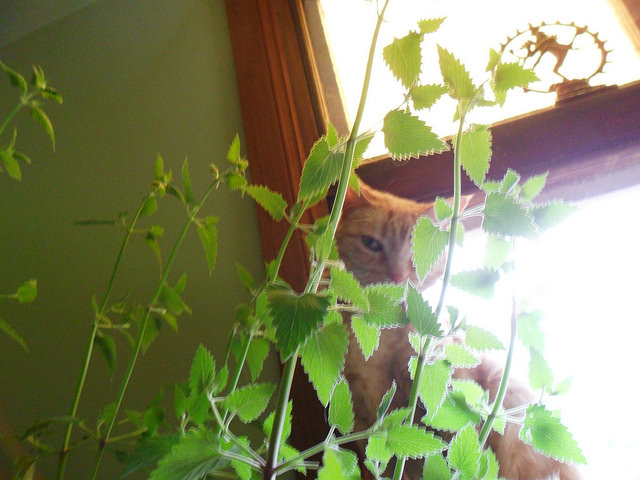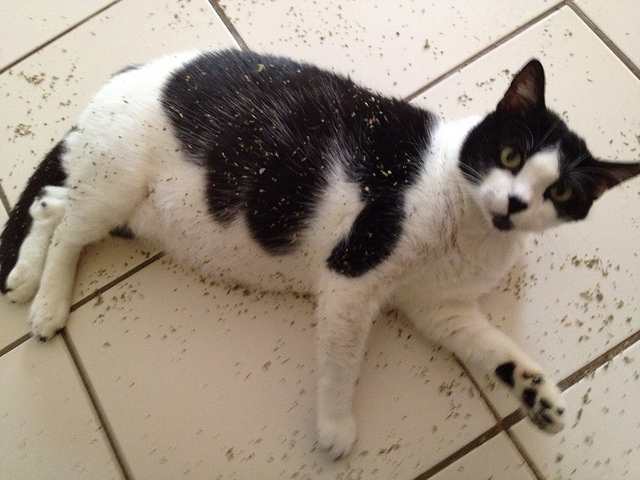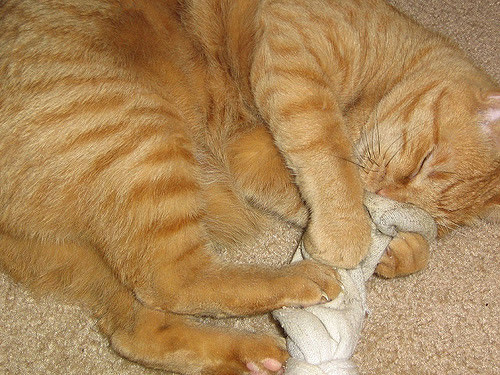We’ve all seen cats in the throes of catnip-induced ecstasy. One sniff and they’re rolling in it, meowing, or suddenly filled with a burst of frantic energy. Catnip is such a cornerstone of the quintessential cat experience that it’s easy to make the assumption that all cats are affected by it equally or that those who aren’t affected are few and far between. It is catnip after all.
You may be surprised to find out that 30-50% of cats don’t care about catnip at all!

Image: LiveVegan : Flickr
Why does catnip do that to your cat?
Catnip, which is a member of the mint family, contains an essential oil called nepetalactone. Sensitivity to nepetalactone is an inherited trait– only cats with a specific gene will respond to catnip. The typical response from sensitive cats comes from smelling the catnip. Researchers aren’t sure yet what causes the reaction but think nepetalactone may stimulate the same receptors in the brain that are effected by “happy” feline facial pheromones. Synthetic feline facial pheromones are commonly used to help anxious cats feel calm and comfortable and can help solve territorial behavior issues like scratching and spraying.
A typical catnip “high” lasts about 10 minutes. After that, most cats will lose interest. It may be several hours before your cat will be affected by catnip again. That means catnip is only effective as an occasional treat. If your cat is exposed to catnip for long periods of time she’ll become immune to it until it has been taken away and she has had time to “reset”.
For the best results, keep your catnip fresh since old catnip will lose its potency. Seal it in an airtight container or ziplock bag and store it in the freezer.

Image: Pat Hawks : Flickr
Are kittens affected by catnip?
If your kitten is genetically predisposed to being affected by catnip, you’ll be able to see the results when she’s still a kitten… but only once she has reached a certain age. The catnip-loving trait won’t activate until she’s 3-6 months old. Until then, no kittens will respond to catnip, whether or not they carry the gene.

Image: Lisa Brank : Flickr
What if your cat doesn’t care about catnip?
If your cat doesn’t carry the specific gene, she won’t care about catnip. If you give her a catnip-stuffed toy she may sniff it and walk away with indifference. That doesn’t necessarily mean she can’t have any catnip-like fun. It turns out that many cats who don’t respond to catnip will respond positively to honeysuckle. There’s a natural chemical in honeysuckle that’s similar to nepetalactone. That natural chemical can elicit the same kind of response even in some cats who are immune to the effects of nepetalactone.
There are almost 200 species of honeysuckle, but only one seems to give cats the catnip response: tartarian honeysuckle (or Lonicera tartarica). Many companies sell honeysuckle toys alongside their catnip toys. Some of them even mix the honeysuckle with catnip in case you aren’t sure which your cat is more likely to respond to. Some species and parts of honeysuckle can be toxic to cats, so be sure you’re buying your honeysuckle products from reputable companies.
